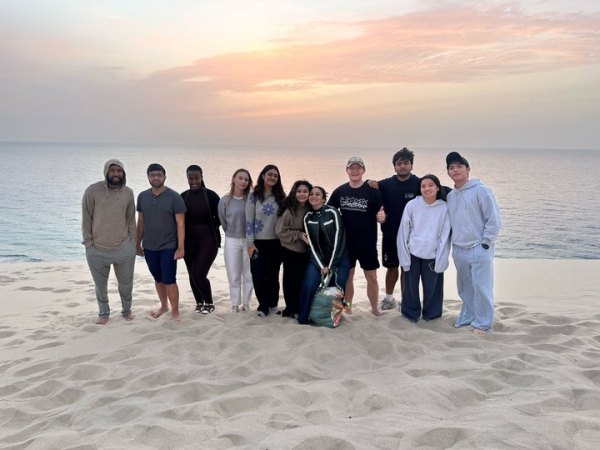Last week, while many Georgetown University students traveled home to see family or embarked on tropical getaways with friends, Betsabe Alfaro (CAS ’25) flew nearly 13 hours overseas to partake in a social justice program in Doha, Qatar.
Alfaro was one of 12 students chosen to participate in the D.C.-Doha Dialogue, an immersive cultural experience aimed at connecting Georgetown’s Washington, D.C. and Qatar (GU-Q) campuses through meaningful conversation and service. This year’s theme focused on social justice and human rights, inspired by the Jesuit value of “people for others.”

Alfaro, a volunteer at Georgetown’s Center for Social Justice Research, Teaching & Service (CSJ), said the program’s focus on helping others led her to apply.
“I do advocacy work for migrant rights here at the CSJ, and our main theme at Doha was also migrant labor rights,” Alfaro told The Hoya. “I think just seeing how the work that I’m doing on campus differs from the work that they’re doing on their campus was what really made me want to go.”
Prior to traveling to Doha over spring break, Alfaro and three other Hilltop students hosted eight GU-Q students in D.C. The sessions sought to allow students to compare social justice initiatives and learn from one another while meeting with experts specializing in migrant and labor rights, engaging in community service and visiting museums.
Alfaro said the programming exposed her to the lack of access to information in Qatar, especially in comparison to the United States.
“For migrant workers, knowing their rights — a lot of that isn’t told to them when they’re being hired for certain jobs. A lot of them are constantly living in fear. They don’t speak up if they’re being mistreated during their time within a company, or they don’t speak up if they face any obstacles that get in their way of their performance,” Alfaro said. “Here, a quick Google search will give you your rights, whereas over there, information is very limited.”
Jay Spacer (SFS-Q ’26), a GU-Q student who took part in the dialogue, said students are still able to address social justice issues in impactful ways despite greater barriers to freedom of expression in Qatar.
“It’s easier to address these issues in the United States because there’s a lot of mobility and freedom to speak out and stuff like that,” Spacer told The Hoya. “In Qatar, although there’s less of that, they have their own creative and unique ways of addressing them. Just because they’re very different, it doesn’t mean that Qatar is any less of a country that can address these issues, these social issues that they have.”
Hassan Hameed (SFS-Q ’27), a GU-Q student who visited the Hilltop campus last summer as part of the program, said he noted differences in expression between D.C. and Doha.
“The people of D.C., I felt, are really more expressive than when you compare with Doha,” Hameed told The Hoya. “What I would like to bring back to campus is that I think we need to, especially on the campus, be more expressive, number one. And I believe we need to voice our concerns.”
Hameed said he saw this expression take place in the Disability Cultural Center (DCC) on the Hilltop campus, a space for disabled students to have conversations about shared experiences, express their concerns and request accommodations.
“One of the things that impressed me, obviously, was the Disability Center and how they’ve created the spaces where people who have accommodations can come spend time, they can be more comfortable and interact with one another,” Hameed said.
The DCC was founded in 2023 after a student-led push to give disabled students an area to collaborate and work to create a culture of access.
Spacer, who has lived in Qatar for the past 15 years, studied abroad at Georgetown’s Hilltop campus this past fall. Spacer said most students did not know much about Qatar.
“From a U.S. perspective, Qatar is almost irrelevant. When I went for a study abroad experience, not a lot of people knew where Qatar was. They were asking if it was a state or a capital, where it’s located on the map,” Spacer said. “And so these led me to kind of infer that not a lot of people from the United States actually know where Qatar is.”
Spacer said the opportunity to enlighten Hilltop students about Qatari culture made the experience even more impactful for him.
“I was very excited for them to experience and see that for themselves. And surprisingly, it resulted into a very good trip,” Spacer said. “Just in terms of them coming here and experiencing it themselves, I was really happy that they were able to.”








